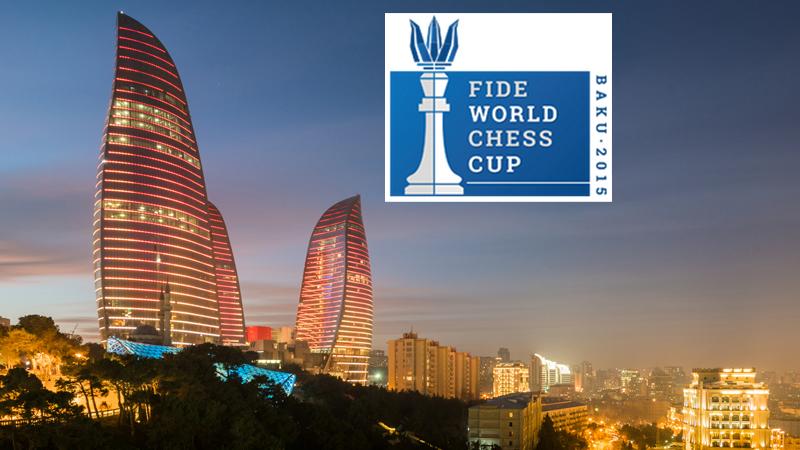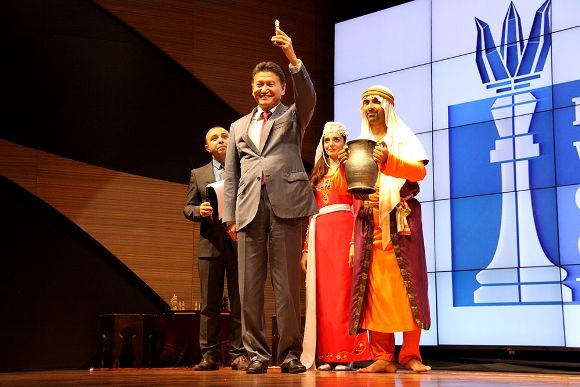
Unprecedented Anti-Cheating Measures At Baku World Cup?
On Thursday the 2015 FIDE World Cup was officially opened in Baku, Azerbaijan. For this edition the players are facing unprecedented anti-cheating measures — or so it seems.
It's finally starting! The first round of the FIDE World Cup, a knockout with 128 participants, takes off today with the first classical game. Tomorrow another classical game follows, and then a tiebreak for all matches that ended in 1-1.
This structure is followed for the first six rounds, including the semi-finals. The final will be played over four classical games, and if necessary a tiebreak on October 5.
The event was officially opened on Thursday night in the Mugham Center in Baku, Azerbaijan. The drawing of lots resulted in the top seed, Veselin Topalov, having White in the first game. You can find the full pairings for today in this PDF.
| Read our full preview on the FIDE World Cup here. |

Before the opening ceremony there was a technical meeting for the players. As it turned out, this World Cup might see unprecedented anti-cheating measures. The following was discussed:
- Random games will be transmitted online with a 15-minute delay, so that players won't know in advance if their game will be live in real-time or not.
- Each round there will be random security checks on five (random) players to see if they're carrying electronics.
- Besides phones, players are not allowed to bring pens and watches to the playing hall (and will use pens provided by the organizers).
- Like in previous FIDE events, players will go through an electronic checkpoint at the entrance of the playing hall.
Sources who attended the meeting told Chess.com that the meeting was chaotic, and many players are not certain if all these measures will be in effect. They do seem somewhat draconian, despite the fact that several cheating incidents occurred in the last four months.
Last Tuesday Chess.com reported on an Italian chess player who was caught with a pendant hanging around his neck, underneath his shirt, which contained a tiny video camera. He also had wires attached to his body, and a small box hidden under his armpit.
In April, at the Dubai Open GM Gaioz Nigalidze was caught using an electronic device in the toilet. In the same month an amateur player was caught, carrying two mobile phones strapped to his legs.
The big question is whether these incidents are a sign that cheating in chess is indeed occurring more often, or that arbiters are getting better at catching the cheaters. Since 2014 they are allowed to search players.
The random 15-minute delay in transmitting the games live online is far from ideal and is a huge concession for eager chess fans to make. The random security checks on five players each round seem redundant when all players are also checked at the start of the round.
The ban of pens and watches suggests that it is possible to use pens (with tiny cameras?) and watches (with chess software?) to cheat during games. That might be the case, but an expert will quickly determine if a player brings such a device. You don't need to ban everything!?
It's a sad day for chess when cheating has reached the point of no watches and pens being allowed. #Technology #Tragedy
— Hikaru Nakamura (@GMHikaru) September 10, 2015
The increase of anti-cheating measures is in sharp contrast with how FIDE has been dealing with security at recent official events.
At the 2013 World Cup, players were checked but visitors and seconds were able to reach the playing hall without going through the electronic checkpoint, and they were able to speak to the players during the games.
At the 2014 Olympiad, then ECU President Silvio Danailov was carrying two mobile phones in the playing hall — officials were apparently not checked.
From very low-key security the World Chess Federation has now jumped to draconian, high-level security. Let's hope that not all of these measures will actually be in effect, and that eventually FIDE will be able to steer a middle course, and all this will be good for our beloved sport.
The FIDE World Cup takes place September 10-October 5 in Baku, Azerbaijan. The two finalists will qualify directly for the 2016 Candidates’ Tournament. The total prize fund is US $1,600,000 (€1,418,000).



left, and Anish Giri on the right. | Photo Eteri Kublashvili.

participating in Azerbaijan. | Photo Eteri Kublashvili.

Previous report


